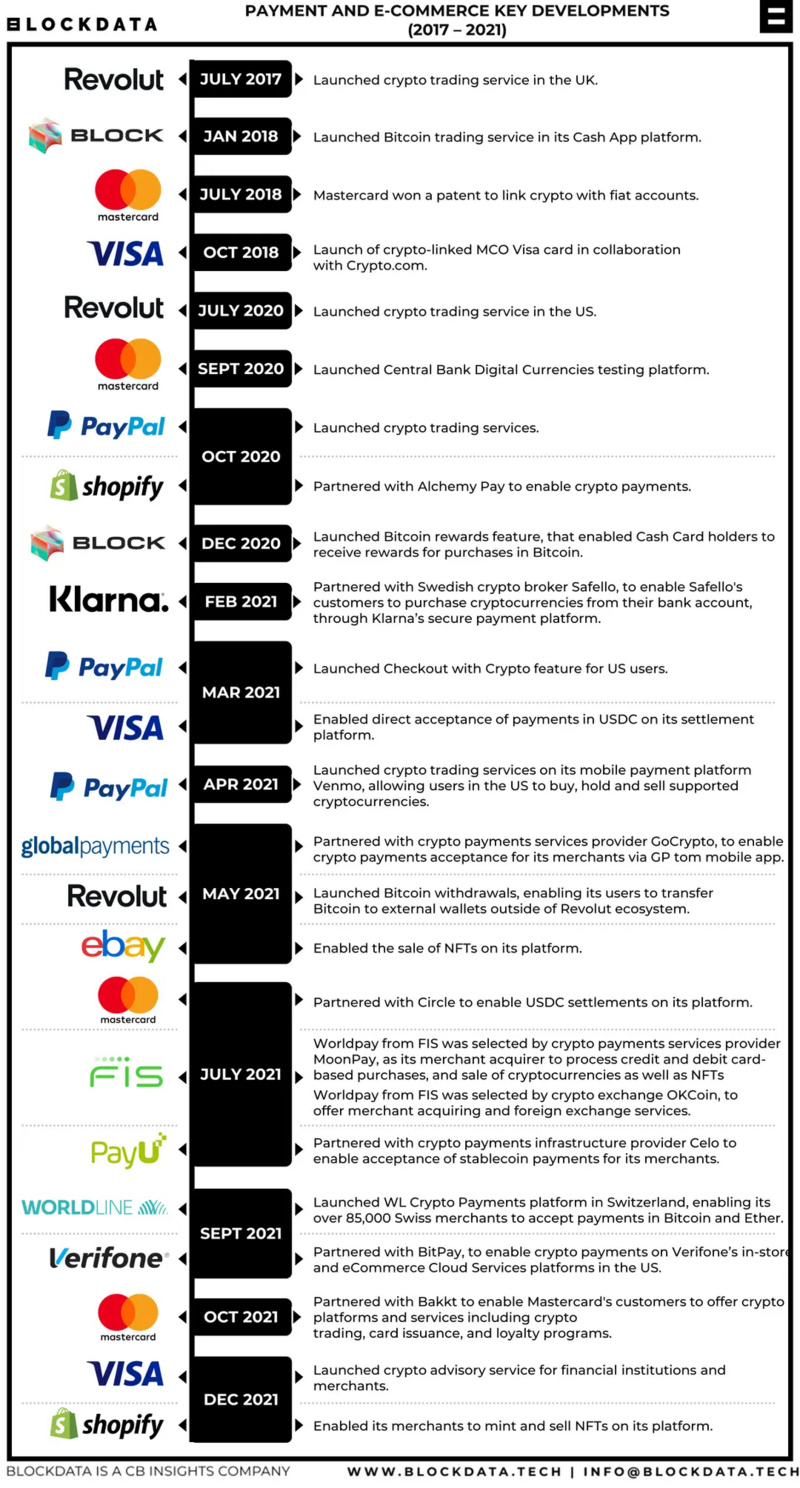The history, current status, and future of the cryptocurrency payment track
Author: Blockdata
Compiled by: Baize Research Institute
The increasing use of blockchain technology has led to significant changes in the global payment market landscape. The demand from individuals and businesses for more efficient payment systems has resulted in cryptocurrencies entering various payment sectors, including remittances, payment cards, and e-commerce. With shorter settlement periods, lower transaction fees, and higher consumer adoption rates associated with cryptocurrency payments, more and more retailers are now accepting cryptocurrency payments. Additionally, traditional payment and e-commerce companies are also venturing into the crypto payment space, providing seamless and secure payment solutions for consumers and businesses.
In this article, we explore how these traditional companies are adopting crypto payments, how they are launching their own crypto payment services, and their collaborations with crypto payment infrastructure providers.
Why do traditional payment companies and e-commerce platforms want to integrate crypto payments?
Currently, traditional methods such as cash, bank transfers, and payment cards still dominate the payment landscape. However, crypto payments are gaining immense traction. According to data released by Visa, in the first quarter of 2022, Visa's payment network processed $2.5 billion worth of crypto transactions, up from $1 billion in the first quarter of 2021.
Cryptocurrencies enable faster global payments by eliminating intermediaries like banks and reducing complexity. Traditional payment companies have been reluctant to adopt crypto technology. However, the recent rapid development of the blockchain/cryptocurrency industry and the growing demand from consumers and businesses have prompted leading payment and e-commerce companies, including Mastercard, Visa, and Shopify, to adopt it.
The high volatility of cryptocurrency prices has been a reason for businesses' reluctance to adopt it; however, with the emergence of stablecoins, businesses are now increasingly interested in integrating crypto payment options. Globally, over 15,000 businesses in industries such as gambling, travel, food, and retail are accepting cryptocurrencies. According to a Deloitte study in December 2021, nearly 75% of retailers plan to accept crypto payments by the end of 2023.
Crypto payments offer several benefits to consumers and businesses, including:
Borderless payments: Cryptocurrencies supported by blockchain facilitate transfers and payments internationally.
Faster settlements: Crypto payments involve fewer intermediaries, resulting in quicker settlements.
Lower costs: Compared to traditional credit card fees of 1.5% to 3.5%, crypto payment fees are around 1%.
Irreversibility: Protects merchants from chargeback fraud (e.g., consumers fraudulently requesting refunds without returning items).
Targeting new consumer groups: Businesses accepting crypto payments can connect with a consumer base among more crypto enthusiasts.
Additional revenue: Accepting cryptocurrencies allows businesses to generate extra income by earning yields from staking or lending their crypto.
Crypto products and services offered by traditional companies and their partners
To meet the diverse needs of crypto enthusiasts, traditional payment and e-commerce companies are collaborating with custodians, payment providers, and other crypto-native service providers to offer various cryptocurrency-based products, such as:
Trading and fund transfer services:
As interest in digital assets grows among a broader consumer base, traditional payment companies like PayPal and Revolut have launched crypto trading services, allowing peer-to-peer transfers through their platforms. PayPal has partnered with blockchain infrastructure provider Paxos, while Revolut has collaborated with Apex Crypto. Similarly, the U.S.-based financial services and payment company Block (formerly Square) also offers Bitcoin trading services through its Cash App platform.
Payment cards:
Both Visa and Mastercard offer crypto payment cards launched in collaboration with cryptocurrency trading platforms and crypto wallets, allowing cardholders to make payments (with cryptocurrencies automatically converted to fiat). Platforms providing Visa crypto payment cards include Coinbase, Bitpanda, and Wirex, while BitPay and Nexo offer Mastercard's crypto payment cards. Some of these cards allow cardholders to earn crypto rewards after accumulating a certain amount of spending.
Merchant payment services:
Traditional payment companies are also enabling their merchants to accept cryptocurrency payments. For example, PayPal offers a service that allows users to check out with cryptocurrencies, enabling them to shop on e-commerce platforms using the cryptocurrencies in their wallets, including Bitcoin (BTC), Ethereum (ETH), Litecoin (LTC), and Bitcoin Cash (BCH). Similarly, payment service provider Worldline has partnered with Swiss crypto service provider Bitcoin Suisse to develop the crypto payment platform WL Payments, enabling its offline and online merchants to accept BTC (via the Lightning Network) and ETH payments.
E-commerce platforms like Shopify, WooCommerce, and BigCommerce are collaborating with various crypto service providers to enable merchants to accept crypto payments. Shopify allows its merchants to accept payments in cryptocurrencies such as BTC, ETH, DogeCoin, MATIC, and BNB through partnerships with Crypto_com, Coinbase's merchant service Coinbase Commerce, BitPay, DePay, OpenNode, and Strike.
Additionally, some payment companies also offer stablecoin settlement services to avoid the complexities of converting digital assets to fiat. Visa has partnered with Fidelity National Information Services' (FIS) payment service subsidiary Worldpay (which in turn collaborates with Circle, the issuer of stablecoin USDC) to enable businesses to receive USDC settlements.
Opportunities for traditional payment and e-commerce platforms
In fact, traditional payment and e-commerce platforms have a significant advantage over crypto-native providers because they possess large user bases, robust systems, and regulatory oversight, making them a safer choice for customers using cryptocurrencies for payments. According to data from Paying With Cryptocurrency, as of June 2022, only about 23% of businesses that accepted crypto payments were receiving cryptocurrencies through crypto-native wallets, with most businesses still utilizing crypto payment solutions provided by traditional payment companies.

Thus, providing crypto payment services can give traditional payment companies a competitive edge. Traditional payment service companies can integrate cryptocurrencies and blockchain technology into their platforms to meet the growing demand for such services.
Development trajectory of crypto payments provided by traditional payment and e-commerce platforms (2017-2021)
The table below highlights some significant developments in cryptocurrency payments by leading traditional payment companies and e-commerce platforms.

Revolut (July 2017): Launched crypto trading services in the UK.
Block (June 2018): Launched Bitcoin trading services on its Cash App payment platform.
Mastercard (July 2018): Obtained a patent linking cryptocurrencies with fiat accounts.
Visa (October 2018): Partnered with crypto trading platform Crypto_com to launch a crypto payment card.
Revolut (July 2020): Launched crypto trading services in the U.S.
Mastercard (September 2020): Launched a central bank digital currency (CBDC) testing platform.
PayPal (October 2020): Launched crypto trading services.
Shopify (October 2020): Partnered with Alchemy Pay to enable crypto payments.
Block (December 2020): Launched a Bitcoin rewards feature, allowing Cash cardholders to earn Bitcoin payment rewards.
Klarna (February 2021): Partnered with Swedish crypto trading platform Safello to enable Safello's customers to purchase cryptocurrencies using their bank accounts through Klarna's payment platform.
PayPal (March 2021): Launched a crypto checkout feature for U.S. users, allowing them to check out online using cryptocurrencies.
Visa (March 2021): Allowed payments settled in stablecoin USDC on its payment network.
PayPal (April 2021): Launched crypto trading services on its mobile payment platform Venmo, allowing U.S. users to trade and hold cryptocurrencies.
GlobalPayment (May 2021): Partnered with crypto payment service provider GoCrypto to offer cryptocurrency acceptance services for merchants using Visa's POS application GP Tom.
Revolut (May 2021): Launched Bitcoin withdrawal feature, enabling users to transfer Bitcoin to wallets outside the Revolut platform.
eBay (May 2021): Launched NFT sales feature on its platform.
Mastercard (July 2021): Partnered with Circle to allow payments settled in stablecoin USDC on its platform.
FIS (July 2021): FIS's Worldpay was selected by crypto payment service provider MoonPay as a merchant acquirer to process credit and debit card-based crypto transactions, as well as NFT sales services; Worldpay was also chosen by crypto trading platform OkCoin to provide merchant collection and forex services.
PayU (July 2021): Partnered with crypto infrastructure provider Celo to offer stablecoin acceptance services for its merchants.
Worldline (September 2021): Launched the crypto payment platform WL Payments in Switzerland, enabling over 85,000 merchants to accept BTC and ETH payments.
Verifone (September 2021): Partnered with BitPay to launch crypto payments on Verifone's online marketplace and e-commerce cloud service platform in the U.S.
Mastercard (October 2021): Partnered with Bakkt to provide crypto-related services for Mastercard customers, including crypto trading, applying for payment cards, and loyalty programs.
Visa (December 2021): Launched cryptocurrency consulting services for financial institutions and merchants.
Shopify (December 2021): Enabled its merchants to mint and sell NFTs on its platform.
Development status in 2021-2022
1. Traditional payment companies further expanded their product offerings:
In June 2022, PayPal expanded its crypto services, allowing its U.S. customers to transfer cryptocurrencies between PayPal and wallets, trading platforms. It also eliminated fees for cryptocurrency transfers between PayPal users and obtained a crypto license (Bitlicense) from the New York Department of Financial Services. In January 2022, the company announced plans to launch its stablecoin to complement its expanding crypto business.
In August 2022, Revolut expanded its crypto services in the UK by launching support for 22 new tokens, enabling its customers to trade over 80 tokens. In September, it registered with the UK's Financial Conduct Authority, allowing it to offer crypto services in the UK. In August 2022, the company also expanded its crypto trading services to Singapore.
2. Traditional payment companies expanded their crypto services through partnerships:
Visa and Mastercard are collaborating with crypto wallets and trading platforms to launch crypto payment cards. On October 17, 2020, Mastercard partnered with crypto trading platform Paxos to develop a solution to help financial institutions offer cryptocurrency trading.
In September 2022, Mastercard partnered with crypto financial service provider hi to launch customizable NFT payment cards. Cardholders can customize their physical payment cards with NFT avatars and use them to pay with fiat, stablecoins, and other cryptocurrencies at any supported merchant. Other partners of Mastercard in 2022 included Nexo and Binance.
Visa launched Visa's crypto payment cards in collaboration with Alterbank and Zro Bank in Brazil, and Satoshi Tango in Argentina.
In June 2022, American Express launched its first crypto payment card in partnership with crypto wallet Abra, allowing cardholders to earn cashback in over 100 cryptocurrencies supported by the Abra platform.
3. Traditional payment companies and e-commerce platforms launched enterprise-focused crypto payment solutions:
In September 2022, BigCommerce partnered with BitPay and CoinPayments to develop a crypto payment solution.
In May 2022, Shopify partnered with Cryptocom to launch the Cryptocom Pay feature, allowing merchants to accept payments in over 20 cryptocurrencies.
In April 2022, U.S.-based payment service company Stripe launched a crypto payment service, allowing its partner platforms to make instant payments to their stakeholders.
In February 2022, eBay integrated crypto payments into its platform. In June 2022, it acquired leading NFT marketplace KnownOrigin.
In December 2021, Block (formerly Square) launched a cryptocurrency gifting feature, allowing its Cash App users to gift a minimum of $1 in Bitcoin.
In February 2022, FIS's Worldpay partnered with Circle to enable businesses to accept payments in USDC. In March 2022, it collaborated with Shyft Network to help its merchants comply with crypto regulations.
In June 2022, Mastercard partnered with several NFT marketplaces, including Immutable X, Candy Digital, The Sandbox, Mintable, Spring, Nifty Gateway, and crypto payment service provider MoonPay, enabling Mastercard cardholders to directly purchase NFTs.
The future of crypto payments looks promising
As merchants and consumers increasingly show interest in digital assets and view cryptocurrencies as a viable and more efficient payment method, it is not surprising that traditional payment companies and e-commerce platforms are adopting crypto payments.
Cryptocurrencies can create an advanced global payment ecosystem, and crypto payments present significant business opportunities for traditional payment companies and e-commerce platforms. The future development of stablecoins will further enhance the speed of crypto payments and reduce transaction costs, which is crucial for businesses continuing to adopt cryptocurrencies.
In summary, crypto payments will open up a new avenue for businesses to serve their customers.









